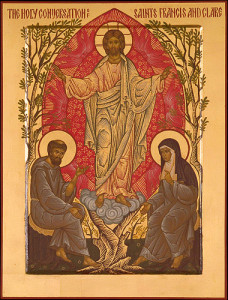|
|
Posted By Teresa Redder, on February 1st, 2026 Joyful Gospel Living
“Seek the Lord, all you humble of the earth…Seek justice, seek humility.”
During the years that I served in the Air Force Reserves and participated in monthly weekend training assemblies, I had the opportunity occasionally to attend Mass at the base chapel. Just as our parish has worship aids that inspire our liturgical celebrations, the chapel also had liturgical art that enhanced the assembly’s prayer experiences. There was a large banner that hung near the altar that said, “Seek peace and pursue it.” This partial quote came from Psalm 34:14, which began with the instruction “Turn from evil, and do good.”
While reading the text from the Prophet Zephaniah this weekend, we hear him speaking to the people of God to “seek the Lord, all you humble of the earth…seek justice, seek humility.” Those words reminded me of those many weekends in the base chapel when I looked at the banner and prayed over the pursuit of peace in our world. In the face of evil in the world, we are called to do good. The good that we seek is justice, always remembering that every person is made in the Divine image and has equal dignity.
There was an important Synod of Bishops that met and subsequently issued a document on November 30, 1971, called “Justice in the World.” During their time together, the bishops addressed many global issues, such as technology; the right to development; migrants; the arms race;’ nationalism; racial and class divisions; and the concentration of the world’s wealth. Fifty-five years later, many of these same issues remain a challenge in our world for all those who seek justice. New ones have been added.
In his Message for the World Day of Peace in 1972, Pope St. Paul VI chose the title “If You Want Peace, Work for Justice.” In opening this document on the Vatican website, I felt a distinct affection for the Holy Father while reading his respectful salutation in the message: “Men of thought! Men of action! All mankind living in 1972!” The Holy Father wanted to reiterate what the bishops had recently summarized after their synod, giving hope to the world:
“It is an invitation which does not ignore the difficulties in practicing Justice, in defining it, first of all, and then in actuating it, for it always demands some sacrifice of prestige and self-interest: Perhaps more greatness of soul is needed for yielding to the ways of Justice and Peace than for fighting for and imposing on an adversary one’s rights, whether true or alleged. We have such trust in the power of the associated ideals of Justice and Peace to generate in modern man the moral energy to actuate them, that we are confident of their gradual victory. Indeed, we are even more confident that on his own modern man has an understanding of the ways of peace, sufficient to enable him to become a promoter of that Justice which opens those ways and sets people travelling them with courageous and prophetic hope.”
In this weekend’s Gospel, Jesus instructed His disciples with a blueprint for what makes God’s Kingdom a reality here and now, by citing the blessings of those who act as God desires. Whenever I read them, I like to hear the “If…then” implications of what Jesus is saying. For example, if you want mercy to be shown to you, then you must first be merciful as God teaches us. My favorite “If…then” is this Beatitude: If you want to be called God’s children, then you must be a peacemaker. From our baptism, we have been chosen to be God’s children by name. It is our baptismal call to be peacemakers. In our daily living, how are we working for justice as St. Paul VI urged us to do?
Recently, my husband Jeff and I had the opportunity to visit both Viet Nam and Cambodia. In both countries, there was evidence of great recovery by the people from the terrible atrocities of long warfare. The people that we met during our visit were kind, friendly, curious, and very proud of their long heritage.
On one of our excursions in Cambodia, we visited a “Killing Fields” site where the Khmer Rouge executed innocent civilians as part of a terrible genocide that saw the annihilation of almost one-third (3 million) of the Cambodian population. As we toured the infamous S21 prison where people were tortured to obtain confessions, our tour guide explained to us that, when the leaders of the Khmer Rouge were finally brought to trial, the Cambodian people did not seek or value revenge as a form of justice. There were no executions of Khmer Rouge after the trials.
For five decades, the Cambodian people have found healing through the four sublime states of Buddhism, the predominant religion of Cambodians: loving kindness, compassion, sympathetic joy, and equanimity. These same values are also integral to our Christian way of life. What are the possibilities in the world when people of goodwill work together to promote a more fraternal world? What resolve is necessary to turn from the subtle seductions of evil to do good?
When the Synod of Bishops met in 1971, there were wars in Southeast Asia, civil wars in Central and South America, and tensions in Africa as countries emerged from colonialism. While those are now part of history, different challenges in our world now urge us to seek justice so that there will be peace. The Beatitudes inspire us to live life with the same passion as Jesus, who showed us the way:
“Blessed are the peacemakers, for they will be called children of God.”
Teresa S. Redder, OFS
Saint Katharine Drexel Regional Minister
At the entrance to the War Remembrance Museum in Ho Chi Minh City (Saigon), Viet Nam
(Photos taken by Teresa Redder, OFS, in January 2026)
“In love, peace remains.”
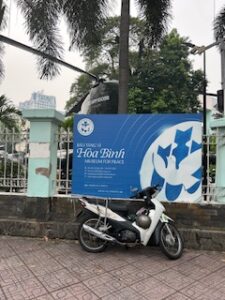 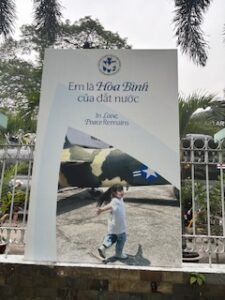 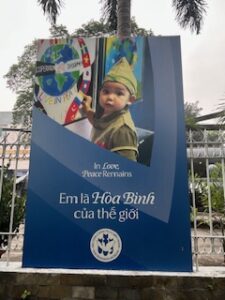
 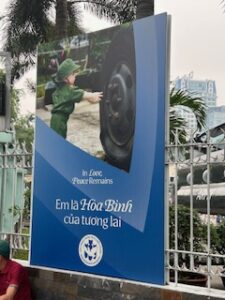
Posted By Teresa Redder, on January 7th, 2026 Joyful Gospel Living
“Then you shall be radiant at what you see…”
Unlike Advent, Lent, and Easter, the Christmas season is not very long in days of celebration: Christmas Eve vigil mass (December 24th) until the Baptism of the Lord (January 11th). During those 19 days, though, we hear some of the most wondrous stories of all time and we meet some of the most unlikely people who opened themselves to being part of God’s extraordinary plan for our salvation.
Whenever I listen to or play Christmas carols on the piano, I hear those stories so clearly. These are not the catchy holiday tunes that have played on the radio since Halloween and disappeared the day after Christmas. The true Christmas carols draw from us the desire to experience awe and wonder about the birth of Christ (although King Herod’s reaction, motivated by pride and envy, had no room for awe and wonder). Here are some noteworthy words from the carols that connect us to people and places: Bethlehem; stable and manger; heavenly host; shepherds and sheep; “Gloria in excelsis Deo”; a guiding star; Magi from the East; treasures of gold, frankincense, and myrrh; and the appearance of the Light of the world, transforming our world with His grace, peace, and beauty.
When my three brothers and I were growing up in Camden, the celebration of Epiphany always occurred on January 6th (before Vatican II). Our faith community looked forward to this celebration because our parish distributed chalk and incense for families to take home to bless their homes for the year ahead. Someone from the family would remind everyone of the three kings (Kaspar/Caspar, Melchior, and Balthasar) and then make an inscription above the doorframe: “20+K+M+B+26.” My Mom would bring out a special bowl with the resin of the incense, lighting its fragrance within each room for the same blessing for our house.
These special traditions help us to appreciate how wondrous it was that the Magi saw the bright star in the sky and followed it to where it led them. These faraway visitors to the newborn King in Bethlehem were the fulfillment of ancient scriptural prophecies in which every nation on earth would adore the Lord. This would become dramatically apparent later when St. Paul had his conversion and chose to bring the Good News to the Gentiles as the Church grew in faith and witness.
During the Christmas season, our worship area is beautifully decorated with the large Fontanini Nativity set and the significant characters in the birth of Christ. When we pause in front of that Nativity set, we understand what the Prophet Isaiah meant when he foretold, “Then you shall be radiant at what you see.” What a privilege to have been present during that wondrous moment! Sacred art enables us to have a taste of what it must have been like.
Our parish Nativity set not only has the Holy Family, offering us their love for one another and God, but also shepherds, animals, and the Magi. The story would not be complete without all of them. Isn’t it interesting that the visit of the Magi is not found in any other Gospel account other than Saint Matthew’s? Let us be grateful that this story and its consequences (the slaying of the Holy Innocents and the flight into Egypt are also significant to the Christmas season) were preserved so that we would understand that Christ’s coming was not totally idyllic and safe.
After more than two years of steady conflict, the Church welcomed Franciscan Fr. Francesco Ielpo, OFM, as the new Custos of the Holy Land. In a true spirit of interfaith dialogue, religious leaders resumed their annual celebration of Hanukkah with Christians and Muslims in Ein Karem, the home village of Zechariah, Elizabeth, and John the Baptist, followed by a Magnificat Institute concert that expanded dialogue to include Muslims. What a special way to bring light and hope to others!
In his first Christmas message as Custos, Fr. Ielpo focused on this Scripture quote: “She gave birth to her firstborn son, wrapped Him in swaddling clothes, and laid Him in a manger.” (Lk 2:7). The foreign Magi saw this, too:
“Jesus is born in a makeshift place, humble and unsuitable. The disruptive image of Christmas is smallness. Here in Bethlehem we contemplate a small God. A stable becomes the place of the infinite. The holiest liturgy is celebrated on straw, with the sharp smell of manure, in the caresses of a mother and in the cry of a child. Once again, Jesus is not afraid to descend to the lowest point of our humanity, made of violence, sin, pain, tears, and hardship. Once again, He is born and asks us, just as we are, to be a cradle for Him, with the poor straw of our fragility. He is laid in the manger to become food, nourishment of hope for all humanity. By looking at Him, contemplating Him, and imitating Him, we can begin again with renewed hope. In the stable of humanity, we are not alone. Jesus is born for us.”
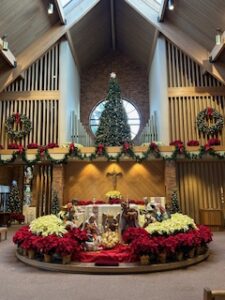 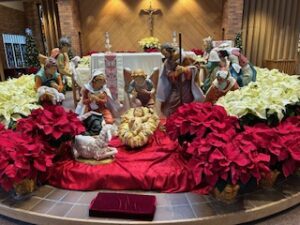
The Prophet Isaiah reminded Jerusalem that they were part of God’s plan: even when darkness covered the earth, the glory of the Lord shone upon them because the light had come for them. On this Epiphany celebration, we share such glad tidings of joy and peace 2025 years later. If we pause to savor what has happened, we will experience what Isaiah foretold. May awe and wonder fill our days!
“…your heart shall throb and overflow.”
Teresa S. Redder, OFS
SKD Regional Minister
Posted By Teresa Redder, on December 3rd, 2025 “This is the King of the Jews.”
As I prayed over what reflection to share for the Solemnity of Christ the King, I could hear a song playing in my head that the Sacred Heart School students have sung at their monthly Masses: The King Shall Come (#70 in our parish hymnal). There is something so hope-filled and prayerful in the words of this song. It bothered me, though, that it was in the Advent section of our hymnal.
While on a Franciscan retreat (November 3-12) to Assisi, Italy, during which we spent nine days reflecting on the Journey into God by St. Bonaventure, my husband Jeff and I joined 30 other pilgrims from the US, Canada, England, Germany, and the Philippines to appreciate how contemplation leads us to God, the Summum Bonum (Highest Good).
On our fourth day together, our retreat leaders asked the group: How does the outside enter us? This was an important spiritual question for those whose desire was to be a lover of God. As we considered that question, we had help from St. Bonaventure regarding three powers of the psyche that are relational:
- Memory → eternity (the image of God);
- Intellect → Truth (meaning of words, sentences, logical conclusions);
- Will → Highest Good (deliberate, judge, desire).
In this chapter, St. Bonaventure wrote, “The function of the memory is to retain and represent not only things that are present, physical, and temporal, but also things that are successive, simple, and everlasting. Memory holds past things by recall, present things by reception, and future things by anticipation.” After reading that, I knew that the song I was hearing was meant for this reflection.
What does our memory tell us about our image of God? Do we understand who Christ the King is and where His Kingdom exists? Do we anticipate the coming of our King by remembering what Christ promised to us?
In this weekend’s first reading, we remember how David became king of Israel, anointed before the Lord to serve the people. Future prophets would later foretell that the Messiah would come from the royal line of David. The Jewish people held that hope in their memory. When Jesus came, though, it was not in the way people would imagine their King would come.
In the song The King Shall Come, the composer Trevor Thomson gives us a song about the King who has already been with us, but told us that He was returning. How are the faithful waiting and longing for that return? Do we see signs of the King in our midst?
The King shall come when morning dawns
and light triumphant breaks,
When beauty gilds the eastern hills
and life to joy awakes.
Not, as of old, a little child,
to bear, and fight, and die,
but crowned with glory like the sun that lights the morning sky.
This weekend’s Gospel account by St. Luke looks at the kingship of Christ through the lens of the Cross. Who would ever expect their king to be crucified by their oppressors? Part of the mockery that Jesus endured was to have the sign above His cross that said, “This is the King of the Jews.” For the people who journeyed with Jesus, this present situation challenged their memory. Nobody yet knew what was to come. One of the criminals that was executed with Jesus did understand it, though, and he asked Jesus to remember him when He entered into His Kingdom. Jesus promised Him that he would be with Him in paradise.
Through the Sacred Scriptures, our memory is able to recall the birth of Christ, the proclamation of the Kingdom, and the Passion of Christ. They are significant past events that shape our faith and our desire to know Christ better.
The people of God today live in much different circumstances than when Jesus preached the Good News. Technology continues to advance rapidly, sometimes with harmful effects on people. Major conflicts continue to erupt in the world that cause great human suffering. Seeing the face of Christ in our midst, a present memory, remains a challenge for all Christians because it requires the full embrace of the three theological virtues of faith, hope, and love.
The criminal who put his faith in Christ trusted that His Kingdom truly existed. Through memory, we know that the death of Jesus was not the end. The resurrection of Jesus was the King’s glory, witnessed by many people. How beautiful, then, is verse 2 of the song for those who believe and hope for the King:
O brighter than the rising morn
when He, victorious, rose
and left the lonesome place of death,
despite the rage of foes.
O brighter than that glorious morn
shall this fair morning be,
when Christ, our King, in beauty comes,
and we His face shall see!
Memory teaches us that the desire for God is something that should be with us daily, shaping our prayer life and our choices to think and act. This weekend, let us sing confidently…
“Come quickly, King of kings! Come quickly, King of kings!
The King Shall Come – Lyrics Video
May God bless our Advent with longing, joy, and hope for what we see and what we await!
Teresa S. Redder, OFS
Saint Katharine Drexel Regional Minister
Posted By Teresa Redder, on November 16th, 2025 “Without fraternity, we cannot survive.”
On November 2nd, Jeff and I left for Assisi to attend a 9-day retreat on St. Bonaventure’s “Journey into God.” At the conclusion of this retreat, we departed Assisi for Rome with many of the 30 pilgrims on our shared journey. Most of our group went to the airport for their return trips to the US, Canada, England, Germany, and the Philippines.
To celebrate the 2025 Jubilee of Hope, though, Jeff and I stayed an additional 5 days in Rome. Our hotel was one block from the Franciscan parish of St. Gregory VII—a special place to visit daily. Thanks to our very early arrival in Rome, we were able to attend the weekly papal audience in St. Peter’s Square on November 12. So many pilgrim groups were there to visit the sacred places of the Church in the hope-filled spirit of Jubilee 2025.
During his catechesis at the papal audience, Pope Leo XIV spoke earnestly about fraternity, an essential word in our Franciscan vocabulary. He told the faithful, “Without fraternity, we cannot survive.” What would the world be like if more people took seriously the call to live as brothers and sisters to one another? In the beautiful hymn “Where Charity and Love Prevail,” there are hope-filled descriptions of what this world would be like. Is it possible that “strife among us be unknown and all contention cease?”
The Vatican News Service posted a summary of the papal audience:
Pope at General Audience: Without fraternity, we cannot survive – Vatican News
With the celebration of St. Frances Xavier Cabrini’s feast day on November 13th, the Church gave us the time to practice solidarity with the poor of the world, because this feast day set the stage for the celebration of the IX World Day of the Poor on November 16th. This was an important observance on the Jubilee 2025 calendar as almost a year of celebrations are drawing to their closure at Christmas.
An international Catholic group called “Fratello” hosted many activities during the weekend:
Friday-November 14th – Prayer Vigil of Mercy (Basilica of St. Paul Outside the Walls)
Saturday – November 15th – Pilgrimages between 9 AM and 3 PM to the four Holy Doors of Rome (St. Peter’s, St. John Lateran, Santa Maria Maggiore, and St. Paul Outside the Walls)
Sunday – November 16th – Holy Mass in St. Peter’s Basilica with Pope Leo XIV for the World Day of the Poor
While sitting in St. Peter’s Square on Saturday, Jeff and I had the privilege of observing the reverent procession of dozens of pilgrim groups from all over the world as they entered the Basilica. Some groups were wearing the Jubilee 2025 logo on hats, bandanas, or T-shirts. Many groups were singing or praying as they waited in the long line to move through Vatican security. It was impossible for anyone to be in the square without passing the poor of Rome who were begging for alms and a kind gesture.
In his homily on Sunday, Pope Leo cited his Apostolic Exhortation Dilexi te of the Holy Father Leo XIV on Love for the Poor (4 October 2025) as a reminder of how God’s love inspires us to love one another, most especially the poor in our midst. The Holy Father spoke about both material poverty, which marginalizes so many people into a daily survival struggle, and spiritual poverty, that leads to loneliness in society. Christians are called to reach out to one another in the way that Christ taught us in the Gospel accounts.
On November 17th, Secular Franciscans have been called to participate in a Franciscan Day of Solidarity as we celebrate the feast day of our patroness, Saint Elizabeth of Hungary. In her short, but very faithful life, she embraced the holy Gospel with purity of heart and made the corporal and spiritual works of mercy visible in her daily life through personal example. In the poor, St. Elizabeth always saw the face of Christ. Now, it is ours to do the same for others.
In our fraternal living, let us work together to see where Christ is calling us to serve the poor in our midst—from the inside of our fraternities and our families to our local communities. This weekend’s celebration reminds us of the transformative power of the three theological virtues: faith, hope, and love.
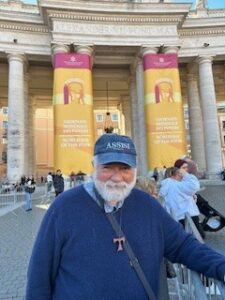 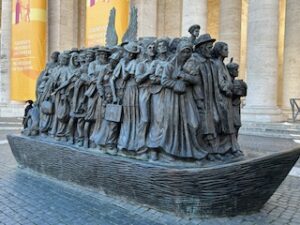
Photos by Teresa Redder, OFS from the Vatican
May the peace of Christ and the intercession of the Blessed Mother guide us to do what is ours to do!
Peace and all good,
Teresa S. Redder, OFS
Saint Katharine Drexel Regional Minister
Rome, Italy (November 16, 2025)
Posted By Teresa Redder, on August 17th, 2025 “I have come to set the earth on fire…”
Ten days ago, I went on a reconnecting journey with my dear friend and fellow music minister Mary Verme to St. Francis Inn in the Kensington neighborhood of Philadelphia. Departing early so that we could attend the daily 8:30 AM Mass, we parked our car on a side street. Immediately, we noticed how many homeless people were now sleeping on the sidewalks close to the Inn, where they felt safer and welcomed.
After entering the chapel, we gave silent greetings to familiar staff members and then watched about a dozen high school girls coming in for worship. Many of them wore T-shirts that said “Visi” on them. This was their last day of volunteering at the Inn.
During the homily, Fr. Michael Duffy, OFM, expressed gratitude to the teens for their week of service at the Inn, noting the many daily challenges that they had experienced in the various ministries of this vibrant community. We learned that these students came from Georgetown Visitation Preparatory Academy in Washington, DC, founded in 1799 by three “pious ladies” from Philadelphia. In 1815, this school received permission from the Vatican to affiliate with and become the first US Visitation community (an order founded by St. Jane Frances de Chantal in 1610 in France). Through the vision of their high school experience, these students were learning how to set the earth on fire for Christ.
One of my favorite Gospel quotes is found in this weekend’s reading, as Jesus says to His disciples: “I have come to set the earth on fire, and how I wish it were already blazing!” What a great visual that gives to us of God’s love that Jesus desires to be revealed in our world today and every day! However, Jesus warns the disciples that if we follow Him without reservation, then we can expect division among us. This is because worldly values are always in such diametric conflict with God’s desires. When called by God to bring messages to the people, every prophet learned the dangerous challenges and even persecutions that accompanied those missions. The prophet Jeremiah understood this all too well.
After the morning Mass, Mary and I sat with Katie Sullivan, the Executive Director of Franciscan Volunteer Ministry (FVM), who coordinates the visits of high school and college students on mission to the Inn, as well as overseeing the intentional community of FVM volunteers who spend 1-2 years in volunteer ministry in Philadelphia or Durham, NC (Note: Mary served as a FVM in Philadelphia).
Katie is an alumna of Georgetown Visitation, so there is a special bond with these students during their annual visits. On mission trips like these, the students’ daily encounters with those who are on the margins of society due to poverty, homelessness, addiction, mental illness, and many other societal hardships can be both inspiring and also overwhelming. How can the faithful help Jesus to realize the fire that He so desires in our world? As community, we need daily reminders that every encounter is an opportunity to bring God’s love to others. Christ calls us into communal action.
After our visit, I did some internet research about Georgetown Visitation, so committed to the Salesian spirituality of Saints Francis de Sales and Jane Frances de Chantal. These high school students share a very simple imperative that they must learn by doing: Live Jesus. In blog testimonies on their website, students shared the difficulties in learning to trust God and to practice the “Little Virtues” that shape the Salesian witness to Christ:
- Kindness
- Gentleness
- Thoughtful Concern for Others
- Humility
- Simplicity
- Hospitality
- Gratitude
- Patience
- Generosity
- Honesty
- Cheerful Optimism
Looking at these highly desirable virtues to make Christ’s Kingdom visible here and now, we might wonder why there would be division in the world or within families when someone intentionally chooses to live in God’s love—to live Jesus. It makes no sense whatsoever that there are people who make choices that are the opposite of those little virtues. Perhaps daily prayer to the Holy Spirit would help to remind us of their necessity. Daily decisions sometimes create a moral dilemma for us:
- Whose example will we follow?
- Are we prepared for opposition when we choose to follow Christ?
- Will we trust in God for courage and fortitude?
- How can we welcome the difficulties that we will encounter as pilgrims of hope?
- Will we recognize Christ at the door?
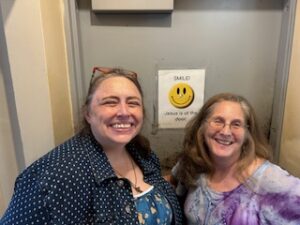 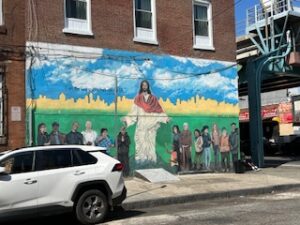
The “Visi” community is bound by an inspiring prayer:
Direction of Intention (St. Francis de Sales)
Oh my God, I give You this day. I offer You now all of the good which I shall do. I promise to accept for love of You all of the difficulty which I shall meet. Help me to conduct myself during this day in a manner most pleasing to You.
Church history clearly tells us that there have been generations of people who listened to the Word of God and committed their lives to tending to the fire of God. If we get discouraged, St. Paul reminds us that their lives paved the way for us to serve Christ today, even amid divisions:
“We are surrounded by so great a cloud of witnesses…” (Heb 12:1)
Teresa S. Redder, OFS
St. Katharine Drexel Regional Minister
Posted By Teresa Redder, on August 2nd, 2025 August 3, 2025
JOYFUL GOSPEL LIVING
“One’s life does not consist of possessions.”
From a variety of news sources that we choose to get our updates, there is always a vast amount of information that is shared: world and national events; health and science updates; sports statistics; weather forecasts and warnings; arts and entertainment happenings; and business trends that affect investors and employees. The world’s population lives as a consumer society that drives the global economy. Much of that demand is reflected in our possessions: clothing, cars, homes, hobbies, jewelry, collectibles, and lots of stuff that we have accumulated in our lifetime. In the first reading from the Book of Ecclesiastes, there is a wise understanding that it is vanity to imagine that any of these possessions has any importance after death. So, do they even matter in life?
In this weekend’s Gospel, a man approaches Jesus to get an opinion on a family inheritance. Jesus speaks to the crowd around Him when He replies: “Take care to guard against all greed, for though one may be rich, one’s life does not consist of possessions.”
Jesus then tells the parable about a rich man who had such a bounteous harvest that he needed to build larger barns to store it. Little did he realize that God was watching him critically. We can only imagine what the crowd heard in that parable: “You fool, this night your life will be demanded of you; and the things you have prepared, to whom will they belong?” What did Jesus mean when He spoke about storing up treasures that are ‘rich in what matters to God’?
Why are people so fascinated by the lifestyles of the rich and famous? There have been many news stories this year of the lavish lifestyles of rich people that are beyond our imagination. When someone has worked with Catholic charities in ministry to the poor, they see firsthand the struggles that people encounter in daily living to obtain the basic necessities of life: food, clothing and shelter. As a contrast, though, it is well known that there is a Pyramid of Global Wealth that is updated periodically and shows the sobering statistics of wealth distribution:
| >$100 Million |
1.1% |
| $100K-$1M |
12% |
| $10K-$100K |
34.4% |
| <$10K |
52.5% |
This is also where we learn that 1% of the world’s population controls 40% of its wealth; the top 10% controls 80% of wealth worldwide. More than half of the world lives in poor circumstances. How do their lives compare in their meager possessions and their struggles to survive? How does that matter to God?
In our Catholic tradition, we have centuries of stories from the lives of the saints to teach us about what matters to God. From the very beginning of the Church, the believers valued a common life and looked out for one another. The earliest stories are in the Acts of the Apostles. They were such vibrant testaments to lives of love that inspired many people to join the Church to bring about God’s Kingdom.
One of the Church’s main charitable agencies to assist the poor is Caritas International. For the Jubilee Year 2025, Caritas invited Catholics of good will to enter into the spirit of jubilee by looking at the issue of world debt with a special campaign:
“The Turn Debt into Hope campaign carries forward Pope Francis’s call for us to mark the Jubilee year in the Catholic Church by addressing the debts of countries ‘that are in no condition to repay the amount they owe.’ Inspired by the Holy Father’s message of solidarity, this global call advocates for debt justice and transformative financial reforms to bring renewed hope to communities burdened by unsustainable debt. Today, more than 50 countries are facing a debt crisis, with many governments forced to spend more on debt repayments to private creditors than on schools, hospitals or protecting their communities from the worsening impacts of the climate emergency. In the face of aid cuts and rising tariffs, which are deepening poverty and inequality in countries already burdened by unsustainable debt, the need for debt relief has never been more critical.”
In the epistle to the Colossians, Saint Paul cautions the community to remain close to the risen Christ by always seeking what is above. He wants them to put to death the earthly things that separate us from God. He refers to greed as idolatry. During this Jubilee Year of Hope, we have many opportunities to reexamine our lives and see where our desires align with those of God for us. If we are ambitious, is it for goodness and justice? Are we generous toward others as God has been generous to us? Where do we find the daily opportunities to ponder what matters to God? As Secular Franciscans, we find wise counsel in our Rule:
Reflection (OFS Rule #11)
Trusting in the Father, Christ chose for Himself and His mother a poor and humble life[1], even though He valued created things attentively and lovingly. Let the Secular Franciscans seek a proper spirit of detachment from temporal goods by simplifying their own material needs. Let them be mindful that according to the Gospel, they are stewards of the goods received for the benefit of God’s children. Thus, in the spirit of “the Beatitudes,” and as pilgrims and strangers on their way to the home of the Father, they should strive to purify their hearts from every tendency and yearning for possession and power[2].
[1] First Letter of St. Francis, 5
[2] Rom. 8,17; Vatican II, Const. on the Church, 7
In the Scripture readings, God is always speaking to us so that we might listen and do what is ours to do. For effective listening, the words need to penetrate our hearts so that we can be the love in the world that God desires so much:
“If today you hear His voice, harden not your hearts.”
Teresa S. Redder, OFS
Saint Katharine Drexel Regional Minister
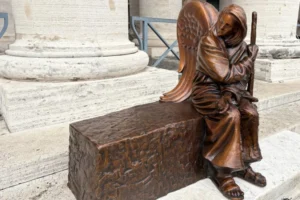
The new statue by Timothy P. Schmalz titled “Be Welcoming” is displayed in St. Peter’s Square (Tuesday, April 15, 2025).
Credit: Victoria Isabel Cardiel/EWTN News
Posted By Teresa Redder, on July 9th, 2025 FOURTEENTH SUNDAY IN ORDINARY TIME (JULY 6, 2025)
“Ask the Master of the harvest to send out laborers for His harvest.”
Two weeks ago, my husband Jeff and I attended a Franciscan visitation in Center City Philadelphia. The minister of this fraternity excitedly told us that their host parish was moving out purposely to support Archbishop Nelson Pérez’s new evangelization. Handing me a copy of their parish bulletin, she pointed out the upcoming pastor’s meeting to energize the faithful to reach out to those who were on the peripheries. Evangelization is a most Franciscan endeavor of living the Good News!
In his pastoral letter to the Archdiocese of Philadelphia ((https://trustandhope.org/wp-content/uploads/2024/12/Pastoral-Letter-FINAL_ENGLISH.pdf), the archbishop described how the Church needed to be:
“We must be a community of Missionary Disciples focused on renewal, rebuilding trust, and inviting people to a relationship with Jesus Christ!”
When he assumed his episcopacy five years ago, Archbishop Pérez faced the daunting challenges of moving from crisis to hope. Many parishioners were fearful of the closures of their beloved parishes. He received great inspiration from the first apostolic exhortation of Pope Francis: Evangelii Gaudium (EG)-The Joy of the Gospel (2013):
“I invite all Christians, everywhere, at this very moment, to a renewed personal encounter with Jesus Christ, or at least an openness to letting Him encounter them…No one should think that this invitation is not meant for him or her, since ‘no one is excluded from the joy brought by the Lord’…Whenever we take a step towards Jesus, we come to realize that He is already there, waiting for us with open arms.” (EG 3) The archbishop reached out to everyone in the archdiocese with this appeal: “We need everyone in our lives and across our local Church to know this. Where do we start?”
In this weekend’s Gospel, Jesus prepares to send out seventy-two disciples in pairs, commenting to them that the harvest is great, but the laborers are few. He then tells them to “ask the master of the harvest to send out laborers for His harvest.” The proclamation of the Kingdom of God was still so new at this time of Jesus’ ministry, yet He entrusted this task to His disciples to go before Him and prepare the way. Now, we are in the Jubilee Year of Hope 2025, and Christ still calls us to this kind of discipleship—through the Magisterium, as Archbishop Pérez has done.
The US Conference of Catholic Bishops (USCCB) has noted the sobering reality that 83% of baptized Catholics don’t come to church. This statistic should concern us, too, and foster a desire in us to be missionary disciples. What does it mean in our world to live without Christ in our lives? Do we understand why Catholics have given up the practice of their faith? In a fast-paced society that uses impersonal technology to stay connected, we frequently encounter young people (and elderly) who are lonely, anxious, and without hope. Despite this reality, our hope endures through the Risen Christ, who reaches out to encounter each of us and invites us to share our experiences with others:
“The Church which ‘goes forth’ is a community of missionary disciples who take the first step, who are involved and supportive, who bear fruit and rejoice. An evangelizing community knows that the Lord has taken the initiative, he has loved us first (cf. 1 Jn 4:19), and therefore we can move forward, boldly take the initiative, go out to others, seek those who have fallen away, stand at the crossroads and welcome the outcast.” (EG 24)
When Archbishop Pérez was the Chairperson of the USCCB Committee on Cultural Diversity in the Church, he approved a pastoral document for evangelization called Creating a Culture of Encounter: A Guide for Joyful Missionary Disciples (May 2019) whose vision was to reach out to those on the margins in a spirit of encounter based on these four objectives, relevant to all disciples of Christ:
- Promote a vision of the Church in mission that invites, engages, and forms youth, young adults, families, and lay ecclesial movements to live out their baptismal vocation.
- Provide a process of faith sharing and missionary activity that prepares Catholics to share and celebrate the Good News of Jesus Christ and to become leaven for the reign of God in society.
- Call all Catholics in the United States to become authentic and joyful missionary disciples by giving witness to God’s love with a prophetic voice by encountering their brothers and sisters in Christ.
- Invite all Catholic leaders to engage and accompany the most vulnerable and those who find themselves on the peripheries of the Church and society.
In our daily lives, each of us is a missionary disciple, laboring within the harvest that Christ desires: in our workplaces, our families, and our communities where we bring the Good News to those who need to experience its joy the most. The culture of encounter has a powerful prayer of trust and hope to inspire us to labor for Christ:
“God of infinite Mercy, You sent Your Risen Son to encounter the disciples on the way to Emmaus. Grant us today a missionary spirit and send us forth to encounter our sisters and brothers: to walk with them in friendship, to listen to their hopes and dreams with compassion, and to proclaim your Word with courage, so that they might come to know You once again in the breaking of the Bread. Make us all missionary disciples, and stay with us always, as we seek to share the joy of the Gospel with people of all generations, from every race, language, culture, and nation. We ask You this with burning hearts, filled with the Holy Spirit, in the name of our Lord Jesus Christ, and through the loving intercession of our Blessed Mother Mary, Our Lady of Guadalupe, Star of the New Evangelization in the Americas. Amen.”
In this weekend’s Gospel acclamation, St. Paul, the consummate missionary disciple, prepares the way for us:
“Let the peace of Christ control your hearts; let the word of Christ dwell in you richly.”
Teresa S. Redder, OFS
Posted By Teresa Redder, on May 10th, 2025 “God will wipe away every tear from their eyes.”
Easter season is the Church’s celebration of the glory of Christ’s resurrection–for fifty wondrous days! As Spring unfolds splendidly around us, we are vividly aware of the signs of new life: in our gardens, our neighborhoods, local parks, and farm fields which will soon provide us with fresh fruits and vegetables. Without any effort on our part, the Lord God provides for “His people, the flock He tends.” (cf. Ps. 100)
On May 24, 2015 (Pentecost Sunday), Pope Francis released the encyclical “Laudato Si’” (LS) for the Church. The title came from the Canticle of the Creatures that St. Francis of Assisi wrote 800 years ago (1225): “Praise be to You, My Lord.” In the introduction to the encyclical, Pope Francis addressed the tears of Sister Mother Earth with this poignant observation: “This sister now cries out to us because of the harm we have inflicted on her by our irresponsible use and abuse of the good with which God has endowed her. We have come to see ourselves as her lords and masters, entitled to plunder her at will. The violence present in our hearts, wounded by sin, is also evident in the soil, in the water, in the air, and in all forms of life.”
In the second reading from the Book of Revelation, St. John has a vision of a great multitude standing before God’s throne, where the Lamb of God, their Shepherd, sits at the center. Despite many dangers, toils, sufferings, and fears, God has delivered His sheep with the assurance that “God will wipe away every tear from their eyes.” In the papal encyclical, Pope Francis gives a profound warning to the world to take care of the common home which God gave to all of us. Noting grave ecological challenges, Pope Francis makes the case for a conversion among people of good will to recognize “the intimate relationships between the poor and the fragility of the planet.” (LS 16) Indeed, there are many tears shed every day throughout the world by those who suffer from the sins of indifference.
Since the completion of his wonderful Lenten book/movie project, Deacon Jim Casa has been promoting his next activity for our parish: the encyclical letter “Laudato Si’” and the movie “The Letter.” On June 1st (Ascension Sunday) at 2:30 PM in Sacred Heart School Library, Deacon Jim has planned to show the video to anyone who wishes to understand ecological conversion better. How timely this offering is as the Church celebrates the 10th anniversary of the encyclical and the 800th anniversary of the Canticle of the Creatures!
As soon as Pope Francis emerged on the balcony at St. Peter’s Square in 2013 as the next successor of St. Peter, he made it a priority of his papacy to evangelize through the importance of relationships: with God, one another, and God’s Creation. By choosing the papal name Francis, he embraced the vision of a medieval saint who made Christ the center of His life, living the Good News with joy and zeal. It is no wonder that the Canticle of the Creatures inspired Pope Francis to write an encyclical to awaken the world to our shared stewardship of God’s goodness that is revealed in all of Creation.
In his book “God’s Love Song: The Vision of Francis and Clare” (Franciscan Media, c. 2024), Franciscan Fr. Murray Bodo, OFM, captures how St. Francis became a Troubadour of the Great King through his daily simple praises of the all-good God, who inspired the saint’s lifetime of loving service to all of God’s creatures. In his final addition to the Canticle. St. Francis even embraced Sister Death:
“The ‘Canticle of the Creatures’ is the great love song of St. Francis of Assisi. It is a beautiful aria, a poem, and a hymn of thanksgiving that praises God and reveals St. Francis’s profound relationship with God and all of God’s creatures. It is a swan song in the tradition of the troubadours before him that puts lyrics to a life of love.”
Deacon Jim’s book/video project is somewhat different this time, because it is difficult to make a movie of an encyclical. In the video, however, the powerful message of the encyclical comes alive through the four stories (five different protagonists) who speak for Mother Earth with personal stories of the need for ecological conversion, so that the tears of those who suffer will be wiped away:
- Cacique Dadá, a leader of the Novo Lugar community of Borari people in the Maró Indigenous Territory of Pará, Brazil;
- Arounda Kandé, a climate refugee from the Kolde Region of Senegal, where 80% of the population lives in poverty;
- Ridhima Pandey, from Hadiwar Uttarakhand, India, who started advocacy at age 9 for alarming climate issues;
- Greg Asner & Robin Marlen, husband and wife marine biologists from Hawaii who have devoted their scientific research for the protection of life.
June 1st is an important date on our calendars: a communal sharing of the encyclical’s message to unite us by hope to care for our common home. Pope Francis invites us to reexamine our relationships:
“Disregard for the duty to cultivate and maintain a proper relationship with my neighbor, for whose care and custody I am responsible, ruins my relationship with my own self, with others, with God and with the Earth. When all these relationships are neglected, when justice no longer dwells in the land, the Bible tells us that life itself is endangered.” (LS 70)
Jesus speaks to us in so many ways—even in book/movie projects! Let’s get to know Him better…
”The glory of God gave it light and its lamp was the Lamb.”
Teresa S. Redder, OFS

SPECIAL BLESSINGS TO ALL AS WE CELEBRATE MOTHER’S DAY!
Posted By Teresa Redder, on April 12th, 2025 April 13, 2025
“I am among you as the One who serves.”
On a personal level, this particular Lenten season has been very different because of the Jubilee Year 2025 and its message of hope. As we begin Holy Week, these words of Pope Francis in the papal bull “Spes Non Confudit” urge us to be renewed by the jubilee: “We need to recognize the immense goodness present in our world, lest we be tempted to think ourselves overwhelmed by evil and violence. The signs of the times, which include the yearning of human hearts in need of God’s saving presence, ought to become signs of hope.”
As we celebrate Palm Sunday, we hear the account of the Passion from St. Luke the evangelist, whose version of what happened with Jesus in Jerusalem gives us unique insights about our own call to discipleship.
Last weekend, I attended a Franciscan Regional Visitation at Daylesford Abbey in nearby Paoli, PA. Our three National Franciscan visitors included two Franciscan friars (from Washington, DC, and Pittsburgh, PA) and a lay Secular Franciscan from Louisiana. All of us were inspired by the spirit of welcome and the charism of the Norbertines, 40 canons who live in communal service to the Church and our local community.
When we checked into the retreat house, our welcome folders had an attached prayer card called “Becoming a People of Reconciliation.” One of our National visitors observed that we should pray that prayer twice on Friday before we went to bed. The opening of this prayer is connected to events in the Passion of Christ:
“Dear Lord Jesus, on the night before You died, You prayed for all Your disciples, ‘Father, may they all be one; that the world may believe it was You who sent Me.’ We know that this is the deepest desire of Your heart.”
During our visitation weekend, the Secular Franciscans celebrated the occurrence of multiple overlapping jubilees:
- The 2025 Jubilee year of Hope (2025 years of Christianity);
- the 1700th anniversary of the Council of Nicaea that gave us our Nicene Creed;
- the 800th anniversary of the Canticle of the Creatures written by St. Francis of Assisi;
- the 30th anniversary of the establishment of St. Katharine Drexel Region Secular Franciscans;
- and the 25th anniversary of the canonization of St. Katharine Drexel, our patroness.
The Jubilee Year of Hope invites us to be people who are dedicated to reconciliation, just like the Norbertine prayer. In this weekend’s readings, we not only hear the Prophet Isaiah foretelling the Suffering Servant and St. Paul explaining what kenosis (self-emptying love) is, but we also listen to Jesus telling His followers, including us, that the humility of God is a reconciliation modeled on Him: “I am among you as the One who serves.” Are we ready to follow Christ?
During our Franciscan gathering, we shared insights from the Handbook for Franciscan Servant Leadership, which is based on a model of imitating Christ in serving others (washing of the feet). Passion Sunday helps us to appreciate the vision of Jesus for His Kingdom, which He proclaimed to be present here and now. That is the joyful Good News that we are to go and live in our world! God loves us so much, and we are to be His loving servants to one another.
 Good leadership is responsible for embracing a shared vision of the future, remembering it is meant to inspire the actions of today. As our weekend at Daylesford continued, I found myself wondering what the Norbertine vision was, so I searched their website and found the Vision Statement of the Order of Prémontré, approved at their General Chapter in 2006: Good leadership is responsible for embracing a shared vision of the future, remembering it is meant to inspire the actions of today. As our weekend at Daylesford continued, I found myself wondering what the Norbertine vision was, so I searched their website and found the Vision Statement of the Order of Prémontré, approved at their General Chapter in 2006:
“Drawn by our merciful and Triune God, we are called as baptized to follow the poor and risen, Christ, in a radical and apostolic way of life according to the Gospel, the Rule of Saint Augustine and the charism of Saint Norbert, the founder of our Premonstratensian Order. Our way of life is marked by: a lifelong seeking after God through fraternal community, a never-ending conversion by giving ourselves to the church of our profession in communion with the self-emptying of Christ, in imitation of Mary pondering God’s Word, and in ceaseless prayer and service at the altar. From the choir and altar, we go to serve the human family in a spirit of simplicity, hospitality, reconciliation, and peace for the benefit of the Church and the world, especially where Christ is found among the poor, the suffering, and among those who do not know Him. We pray that what God’s Spirit has begun in us may be made perfect in the day of Christ Jesus.”
As we begin Holy Week, let us take time to contemplate the vision of Christ for His Church, remembering that He emptied Himself for our sake in obedience–even unto death on a Cross! The Norbertine vision is so full of Easter symbols: our baptismal call; fraternal communion; never-ending conversion in communion with the self-emptying of Christ; and ceaseless prayer, just as Mary embraced the Word of God.
Are we willing to serve God with humility and self-emptying? Jesus gave us our inheritance in this Gospel account, so let us decide what we are to do with this treasure that He gave to us:
”I confer a Kingdom on you, just as My Father has conferred one on Me.”
Teresa S. Redder, OFS
Saint Katharine Drexel Regional Minister
Posted By Teresa Redder, on March 16th, 2025 SECOND SUNDAY OF LENT
“My brothers and sisters…stand firm in the Lord.”
 Whenever my husband Jeff and I have been on pilgrimages to other countries, we have had the privilege to meet many priests and religious who serve in the foreign missions. When Jesus shared the Good News with His first followers, He expected them to go out to all the world and share what they had seen and heard. In their limited understanding of the world at that time, though, those first disciples were limited by geographical borders that were known mainly by trade routes or conquests. So much of the world was still waiting to be explored! Whenever my husband Jeff and I have been on pilgrimages to other countries, we have had the privilege to meet many priests and religious who serve in the foreign missions. When Jesus shared the Good News with His first followers, He expected them to go out to all the world and share what they had seen and heard. In their limited understanding of the world at that time, though, those first disciples were limited by geographical borders that were known mainly by trade routes or conquests. So much of the world was still waiting to be explored!
Why was St. Paul compelled to tell the Philippians to “stand firm in the Lord”? Even in their time, people living ordinary lives in common society had to be reminded that people of faith, whose minds were occupied with earthly things, are citizens of heaven. During our Lenten journey, is our daily prayer helping us to stand firm in the Lord?
During our pilgrimages, the missionaries that we met shared many stories of their compassionate encounters with people in developing countries: education, health care, maternity services, cooperative projects for sustainability, and trauma relief for those who had seen great violence and destruction. In our Lenten experiences, most of us are safe from harm, comfortable with our food, clothing, and shelter, and far away from those who are suffering. A good question to ask ourselves during Lent: How does Catholic social teaching on solidarity shape our almsgiving? Do we hear the cry of the poor when they are suffering?
Before Ash Wednesday, I was on a special Zoom call hosted by the Franciscan Sisters of Philadelphia in Aston, PA. Their guest speaker was a staff member of Catholic Relief Services (CRS), who spoke about the need to continue funding programs that provide care all over the world. After the speaker’s opening remarks, we shared questions and comments. One of the elderly religious sisters (who participated on that call from Africa after midnight!) was a 30-year missionary to Kenya, where she had been working faithfully in AIDS ministry to children. Because of CRS support, she told us with gratitude that they no longer had any children who passed away due to AIDS. She was concerned about what would happen there when their current supplies of medicine are expended and there is no additional funding to obtain medicines.
Motivated by this Zoom call, the Franciscan Sisters’ Care for Creation Committee voted unanimously to focus the community’s Lenten almsgiving on the CRS Rice Bowl project. I visited the CRS website to see what kind of new insights were there for donors to appreciate the challenges better. The CRS Mission Statement resonates with the Gospel’s message of transfiguration:
“Catholic Relief Services carries out the commitment of the Bishops of the United States to assist the poor and vulnerable overseas. We are motivated by the Gospel of Jesus Christ to cherish, preserve and uphold the sacredness and dignity of all human life, foster charity and justice, and embody Catholic social and moral teaching.”
On the CRS home page, I found a special link that was posted on March 5th:
CRS’ Rice Bowl Program Celebrates 50 Years of Global Hunger Reduction | CRS
I can still remember the joy that our family had when our four adult children were growing up to fill the CRS Rice Bowl together during our Lenten journey.
As I thought about the Franciscan sisters, who take a vow of poverty, live in service to others, and made this a special Lenten priority because the need in the world is greater now than ever, I thought about God promising Abram that his descendants would be more numerous than the stars in the heavens. So many centuries later, his descendants (Jewish, Christian, and Muslim) number in the billions and live on five continents! Yet CRS reminds us that we must urgently take care of many of these brothers and sisters who need our compassion and generosity:
“According to the United Nations Food and Agriculture Organization, more than 580 million people could be chronically undernourished in 2030 – just five years away – if the trajectory is left unchecked. Elevated hunger levels are quickly becoming the new normal, causing long-term and generational harm to children, families and communities. More than 340 million people around the world are currently facing some level of food insecurity, with nearly 2 million facing catastrophic hunger – primarily in Gaza and Sudan. Many of these food crises involve overlapping issues that increase year after year.”
We can inspire our children and grandchildren to stand firm in our world that is too often preoccupied by earthly distractions by taking less than two minutes to watch this YouTube video about the CRS Rice Bowl’s history:
https://youtu.be/5QoPVNxKEGE
It is so easy to stand firm in solidarity with the poor:
Online: crsricebowl.org/give
Phone: 877-435-7277 (8 AM-11 PM ET) for CRS Rice Bowl
Mail (Please write “CRS Rice Bowl” on memo line of check):
Catholic Relief Services (Attn: CRS Rice Bowl)
P.O. Box 5200
Harlan, IA 51593-0700

May this CRS Prayer shape our Lenten desires:
“Jesus, Bread of Life, as we encounter You in the Eucharist this Lent, nourish us with Your love, unite us in communion with our sisters and brothers, showing us how we are connected. Transform [transfigure] our hearts, that we may be moved to share bread for life with our global family and work for a world where all can thrive. AMEN.”
Teresa S. Redder, OFS
Saint Katharine Drexel Regional Minister
|
|








